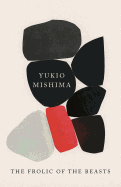
One of the greatest Japanese writers of the 20th century, Yukio Mishima is known to most Westerners for his Sea of Fertility tetralogy and his shocking death by ritualistic suicide in 1970. Translated into English for the first time, The Frolic of the Beasts is a short novel from 1961 and a takeoff of Japanese Noh theater (a form of art Mishima loved). A tale of lust, violence and acceptance, the story stands as another example of his genius.
The Frolic of the Beasts is nominally about a love triangle. A young man, Koji, begins an affair with his boss's wife, Yuko, leading to a violent encounter where he cripples his employer. Sent to jail for two years, Koji is then taken in by Yuko and Ippei, the husband who is now a shell of his former self. But Mishima isn't interested in a battle of wills between his male characters; instead he focuses on how each person in his triad makes the lives of the others unbearable. Powerless to break away from the strange relationship they've created, Koji, Yuko and Ippei start down a road that leads to further bloodshed.
Much of Mishima's work has a bitter, almost nihilistic quality to it, and The Frolic of the Beasts is no exception. The novel uses its short running time to explore the ways humans create lies in order to prop up their worldviews, and how issues of sex and power can fray or solidify those lies. The Frolic of the Beasts may be a "lesser work" in Mishima's oeuvre, but it's yet another example of his mastery. --Noah Cruickshank, adult engagement manager, the Field Museum, Chicago, Ill.

